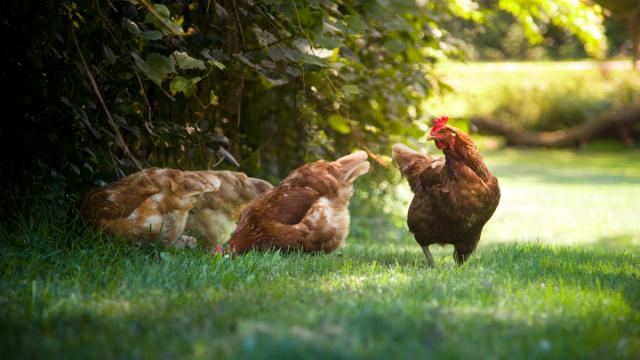The coronavirus lockdown has made us a lot of things — gardeners, chefs, bakers and maybe even bilingual in some cases. It’s also apparently made a lot of us backyard chicken owners, leading to an increase in salmonella outbreaks.
The Food Safety Information Council has released a warning to all the new chicken owners out there after a recent spike in salmonella cases.
It said there had been 17 new cases in Queensland with five of them needing to go to hospital. In Victoria, there were nine cases linked to a rarer strain of salmonella and five of the cases were linked to newly-bought chickens.
The council’s chair, Cathy Moir, urged new chicken owners to take personal hygiene seriously around handling chickens and their eggs. Simple tasks included regular hand washing, purchasing vaccinated chickens from legitimate sellers and monitoring new chickens for signs of disease.
“It’s great to have fresh eggs and for your kids to learn about where their food comes from but backyard chooks and ducks can be a source of Salmonella infections which can cause serious illnesses and, in some people, can lead to chronic conditions such as Reiter’s Syndrome or reactive arthritis,” Moir said in a media release.
“When purchasing pet chickens you should look for vaccinated birds from a reputable commercial source and keep them healthy with medications for parasites including roundworms and tapeworms. Also, if your chickens look unwell check with a vet.”
How to handle backyard chooks safely
If you are a new chook parent, it doesn’t mean you suddenly need to freak out — there are a number of simple steps you can take to limit the chance of salmonella infection.
As always, washing your hands after handling the bird or anything it comes into contact with is a great habit to always follow. Another simple step is to avoid kissing the chicken or letting children eat food around them.
If you have chickens to provide you with freshly-laid eggs, you’ll also need to pay close attention to the eggs. Any cracks on the egg could invite bacteria so make sure you wipe away any dirt to check the egg is in tact.
The council also provided a number of handy tips to follow if you’ve got a feathery friend in the family:
- Keep the nesting materials and litter clean and dry and change it regularly.
- Gather eggs from their nesting places daily to make sure they are fresh. Label them with the date and store in the fridge in a clean, covered container away from other ready to eat foods.
- Carefully check eggs for any cracks, wipe off any visible dirt with a dry cloth or paper towel but don’t wash the eggs in water – this can transfer the contamination into the egg contents.
- Always remember to wash your hands with soap and water and dry thoroughly after handling your chickens and their eggs. If children and grandchildren have been helping, be sure they wash their hands too. The bacteria can live inside poultry enclosures so wash hands even if you do not touch the birds.
- Don’t let children snuggle or kiss the birds, touch their mouth, or eat or drink around chickens and don’t allow chickens inside the house.
- Don’t keep or store chicken food or storage containers in or near kitchens or other food preparation areas.
- Don’t wash the chickens’ food and water bowls in sinks used for food preparation, washing kitchen utensils or for obtaining drinking water.
- Don’t use backyard eggs in egg dishes that will be served raw or only minimally cooked, as the shells are more likely to be contaminated with Salmonella than commercially washed eggs, which are washed under carefully controlled conditions.

Leave a Reply
You must be logged in to post a comment.